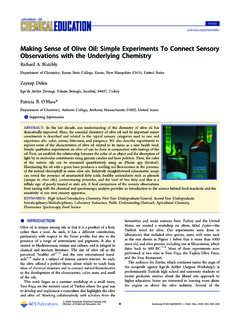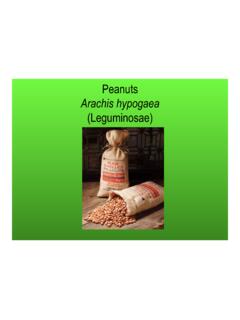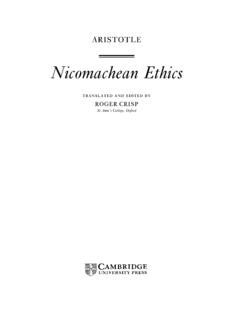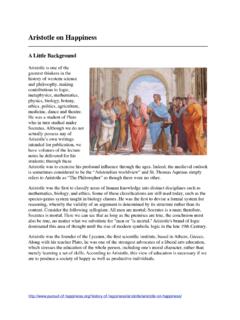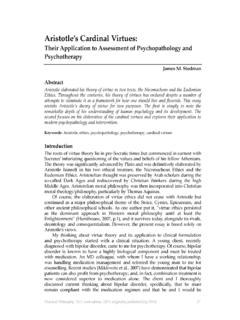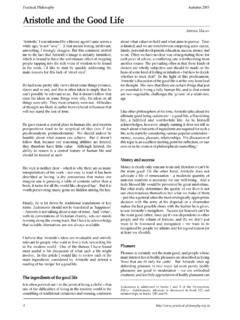Transcription of The Poetics of Aristotle, by Aristotle
1 The Project Gutenberg EBook of Poetics , by AristotleThis eBook is for the use of anyone anywhere at no cost and withalmost no restrictions whatsoever. You may copy it, give it away orre-use it under the terms of the Project Gutenberg License includedwith this eBook or online at : PoeticsAuthor: AristotleTranslator: S. H. ButcherRelease Date: November 3, 2008 [EBook #1974]Language: EnglishCharacter set encoding: ASCII** START OF THIS PROJECT GUTENBERG EBOOK Poetics **Produced by An Anonymous Volunteer, and David WidgerTHE Poetics OFARISTOTLEBy AristotleA Translation By S.
2 H. Butcher[Transcriber's Annotations and Conventions: thetranslator left intact some Greek words to illustrate aspecific point of the original discourse. In thistranscription, in order to retain the accuracy of thisThe Poetics of Aristotle , by of 391/25/12 10:06 PMtext, those words are rendered by spelling out eachGreek letter individually, such as {alpha beta }. The reader can distinguish these words bythe enclosing braces {}. Where multiple words occurtogether, they are separated by the "/" symbol forclarity.]
3 Readers who do not speak or read the Greeklanguage will usually neither gain nor loseunderstanding by skipping over these who understand Greek, however, may gain adeeper insight to the original meaning anddistinctions expressed by Aristotle .]ContentsAnalysis of ContentsARISTOTLE'S POETICSIIIIIIIVVVIVIIVIIIIXXXIXIIXIIIXIV XVXVIXVII 'Imitation' the common principle of the Arts of Poetry. The Objects of Imitation. The Manner of Imitation. The Origin and Development of Poetry.
4 Definition of the Ludicrous, and a brief sketch of the rise of Comedy. Definition of Tragedy. The Plot must be a Whole. The Plot must be a Unity. (Plot continued.) Dramatic Unity. (Plot continued.) Definitions of Simple and Complex Plots. (Plot continued.) Reversal of the Situation, Recognition, and Tragic or disastrous Incident defined and explained. The 'quantitative parts' of Tragedy defined. (Plot continued.) What constitutes Tragic Action. (Plot continued.) The tragic emotions of pity and fear should spring out of the Plot itself.
5 The element of Character in Tragedy. (Plot continued.) Recognition: its various kinds, with examples. Practical rules for the Tragic Poetics of Aristotle , by of 391/25/12 10:06 PMXVIIIXIXXXXXIXXIIXXIIIXXIVXXVXXVI Further rules for the Tragic Poet. Thought, or the Intellectual element, and Diction in Tragedy. Diction, or Language in general. Poetic Diction. (Poetic Diction continued.) How Poetry combines elevation of language with perspicuity. Epic Poetry. (Epic Poetry continued.) Further points of agreement with Tragedy.
6 Critical Objections brought against Poetry, and the principles on which they are to be answered. A general estimate of the comparative worth of Epic Poetry and 'S POETICSII propose to treat of Poetry in itself and of its various kinds, noting theessential quality of each; to inquire into the structure of the plot as requisite to agood poem; into the number and nature of the parts of which a poem iscomposed; and similarly into whatever else falls within the same , then, the order of nature, let us begin with the principles which poetry and Tragedy, Comedy also and Dithyrambic: poetry, and the musicof the flute and of the lyre in most of their forms, are all in their generalconception modes of imitation.
7 They differ, however, from one: another in threerespects, the medium, the objects, the manner or mode of imitation, being ineach case as there are persons who, by conscious art or mere habit, imitate andrepresent various objects through the medium of colour and form, or again by thevoice; so in the arts above mentioned, taken as a whole, the imitation is producedby rhythm, language, or 'harmony,' either singly or in the music of the flute and of the lyre, 'harmony' and rhythm alone areThe Poetics of Aristotle , by of 391/25/12 10:06 PMemployed; also in other arts, such as that of the shepherd's pipe, which areessentially similar to these.
8 In dancing, rhythm alone is used without 'harmony';for even dancing imitates character, emotion, and action, by is another art which imitates by means of language alone, and that eitherin prose or verse which, verse, again, may either combine different metres orconsist of but one kind but this has hitherto been without a name. For there isno common term we could apply to the mimes of Sophron and Xenarchus and theSocratic dialogues on the one hand; and, on the other, to poetic imitations iniambic, elegiac, or any similar metre.
9 People do, indeed, add the word 'maker' or'poet' to the name of the metre, and speak of elegiac poets, or epic (that is,hexameter) poets, as if it were not the imitation that makes the poet, but the versethat entitles them all indiscriminately to the name. Even when a treatise onmedicine or natural science is brought out in verse, the name of poet is by customgiven to the author; and yet Homer and Empedocles have nothing in common butthe metre, so that it would be right to call the one poet, the other physicist ratherthan poet.
10 On the same principle, even if a writer in his poetic imitation were tocombine all metres, as Chaeremon did in his Centaur, which is a medleycomposed of metres of all kinds, we should bring him too under the general termpoet. So much then for these are, again, some arts which employ all the means above mentioned,namely, rhythm, tune, and metre. Such are Dithyrambic and Nomic poetry, andalso Tragedy and Comedy; but between them the difference is, that in the firsttwo cases these means are all employed in combination, in the latter, now onemeans is employed, now , then, are the differences of the arts with respect to the medium the objects of imitation are men in action, and these men must be eitherof a higher or a lower type (for moral character mainly answers to these divisions,goodness and badness being the distinguishing marks of moral differences)
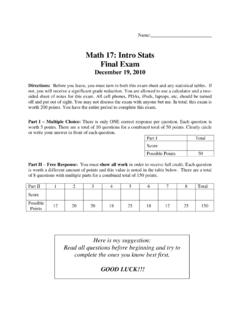
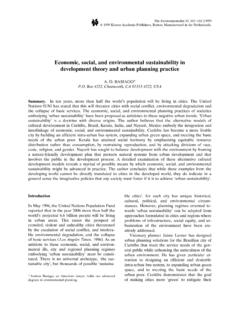

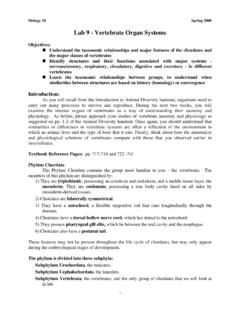
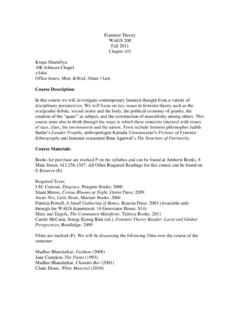
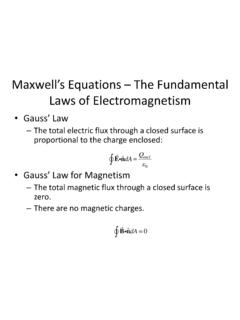
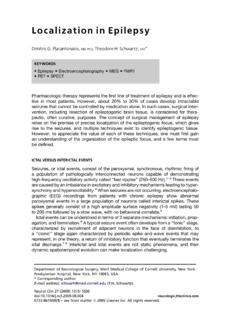
![[Fill-in-the-blank] tests measure and multiple choice ...](/cache/preview/5/e/e/9/b/f/1/7/thumb-5ee9bf17e1539b3a63fea89d05cad259.jpg)
